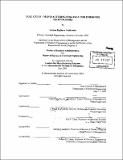Fuel cells : manufacturing strategy for emerging technologies
Author(s)
Tadikonda, Kalyan Raghava, 1966-
DownloadFull printable version (4.923Mb)
Other Contributors
Leaders for Manufacturing Program.
Advisor
Stephen C. Graves and Frank R. Field, III.
Terms of use
Metadata
Show full item recordAbstract
Firms attempting to commercialize emerging technologies face unique challenges. Strategy making is one of the major challenges especially when the industry structure is embryonic. In this environment, it is important not only to remain flexible to accommodate the evolving market demands, but also to develop the infrastructure to respond to target markets quickly. This thesis presents a framework for developing a manufacturing strategy for emerging technologies and provides a case study for utilizing the model within fuel cell industry. The thesis develops a framework for manufacturing strategy, which includes four phases that lead to product introduction and capacity· expansion for the company to rapidly ramp up production if the product generates high demand. As further market information and customer input are obtained after product introduction, the different phases can be iterated to achieve low cost, high volume manufacturing for full commercialization. This framework was applied to understand International Fuel Cells business plan for residential/light commercial fuel cell commercialization, perform cost analysis on the product, identify core components, assess options for supplier development, determine operations requirements and examine options for capacity expansion. The business plan provided input into the project volumes of production. The production volumes were utilized to perform cost analysis. Cost analysis was used to identify potential technological breakthroughs that would render fuel cells competitive with existing technologies for power generation and transportation. Quality Function Deployment (QFD) was utilized to identify core subsystems and components. The different supply chain options and the applicable options for each of the core components were identified. These analyses provided insight into the components that needed investments for technology development. Operation requirements were estimated and capacity expansion options discussed. These options provided insight into the potential investments required. in the near term for residential fuel cell commercialization.
Description
Thesis (M.B.A.)--Massachusetts Institute of Technology, Sloan School of Management; and, (S.M.)--Massachusetts Institute of Technology, Dept. of Chemical Engineering; in conjunction with the Leaders for Manufacturing Program at MIT, 2001. Includes bibliographical references (p. 75-76).
Date issued
2001Department
Leaders for Manufacturing Program at MIT; Massachusetts Institute of Technology. Department of Chemical Engineering; Sloan School of ManagementPublisher
Massachusetts Institute of Technology
Keywords
Sloan School of Management., Chemical Engineering., Leaders for Manufacturing Program.